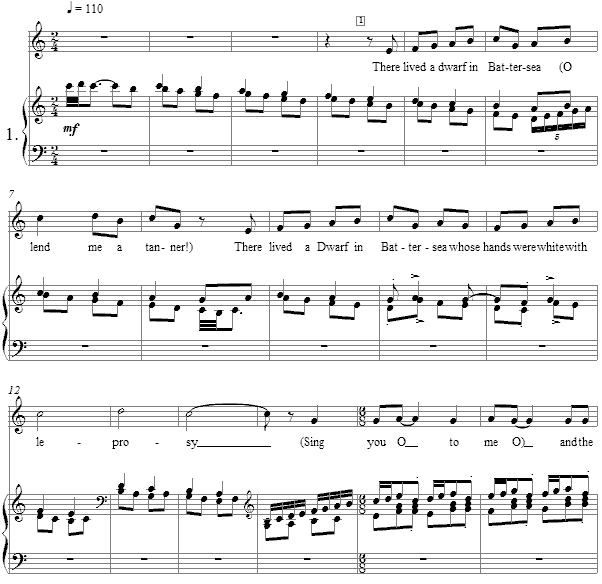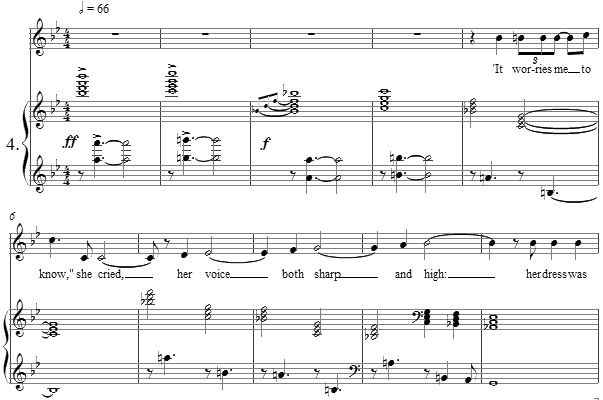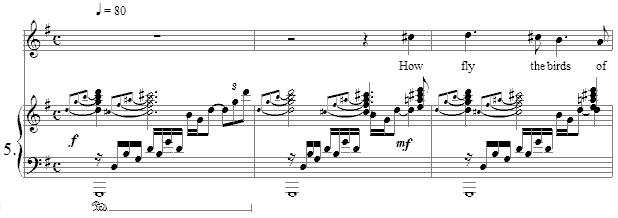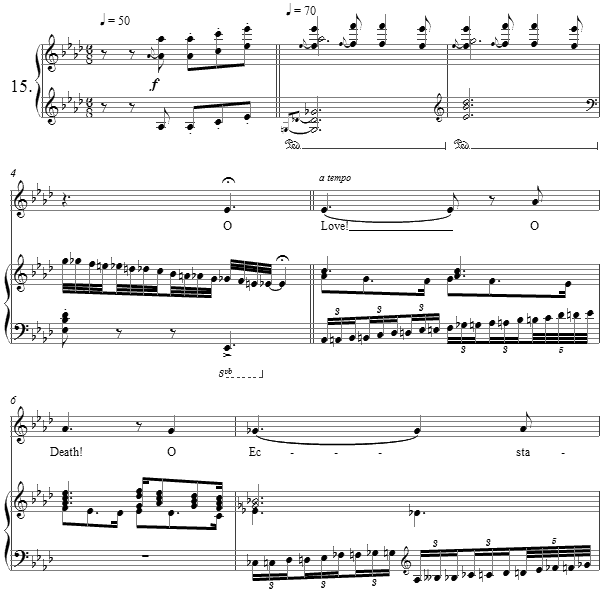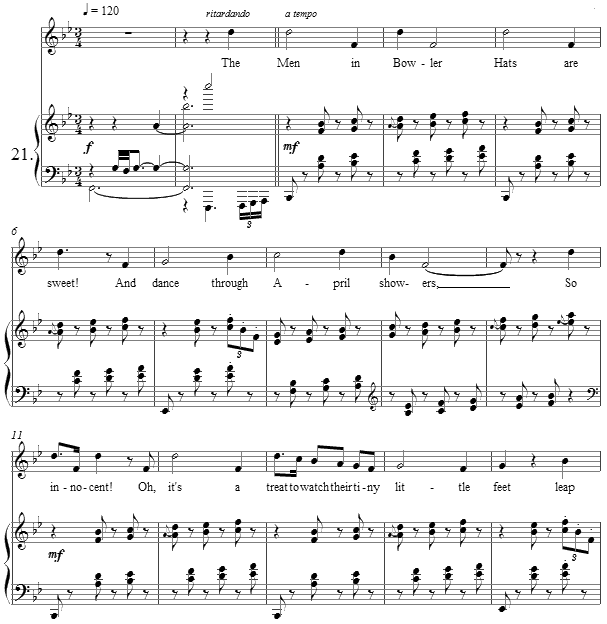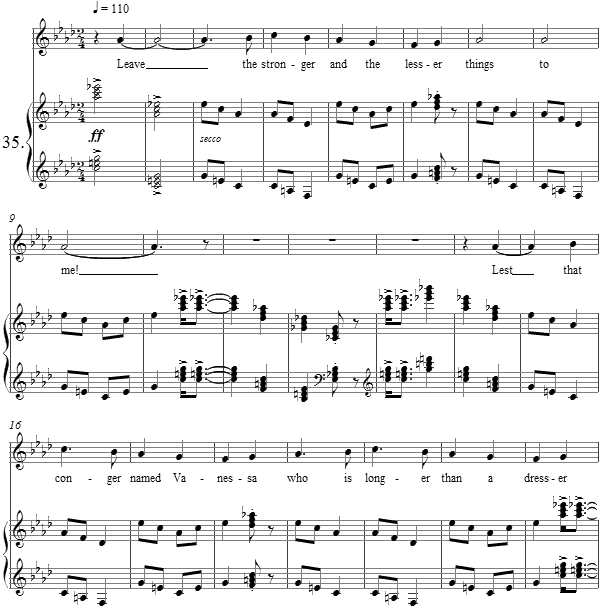Music and Texts of GARY BACHLUND
Vocal Music | Piano | Organ | Chamber Music | Orchestral | Articles and Commentary | Poems and Stories | Miscellany | FAQs
A Book of Nonsense - (2008)
Texts of Mervyn Peake
for high, medium or low voice and piano
This planned collection of thirty-seven song settings to the book of the same name, A Book of Nonsense, by Mervyn Peake. The home page of the official site, maintained by Sebastian Peake is found at www.mervynpeake.org, as well as a continuing blog of recent activities about this fine twentieth century artist and author.
The song settings are varied, from a single page to very long songs wholly based on the texts themselves.
A Book of Nonsense - (2008) Mervyn Peake
( noted herein as a Work-in-progress, release date Fall 2008 )
for high, medium or low voice and piano (three editions)
i. The Dwarf of Battersea
ii. Little Spider
iii. O Little Fly
iv. 'It Worries Me to Know'
v. How Fly the Birds of Heaven
vi. Of Pygmies, Palms and Pirates
vii. And Old and Crumbling Parapet
viii. It Is Most Best
ix. O'er Seas That Have No Beaches
x. 'Come, Break the News to Me, Sweet Horse'
xi. An Angry Cactus Does No Good
xii. I Cannot Give You Reasons
xiii. The Trouble With Geraniums
xiv. Crocodiles
xv. O Love! O Death! O Ecstasy!
xvi. O Here It Is! And There It Is!
xvii. I Have My Price
xviii. Lean Sideways on the Wind
xxix. Tintinnabulum
xx. The Hideous Root
xxi. The Men in Bowler Hats Are Sweet
xxii. Shrink, Shrink
xxiii. Aunty Jane (Aunts and Uncles)
xxiv. Aunty Grace (Aunts and Uncles)
xxv. Uncle Wog (Aunts and Uncles)
xxvi. Aunty Flo (Aunts and Uncles)
xxvii. Aunty Vi (Aunts and Uncles)
xxviii. Uncle Sam (Aunts and Uncles)
xxix. Aunty Nag (Aunts and Uncles)
xxx. Aunty Mig (Aunts and Uncles)
xxxi. Aunty Jill (Aunts and Uncles)
xxxii. Uncle Jake (Aunts and Uncles)
xxxiii. Crown Me With Hairpins
xxxiv. Squat Ursula
xxxv. Leave the Stronger
xxxvi. The Thread Remains
xxxvii. The Adventures of Footfruit
Mervyn Peake
Mervyn Peake (1911-1968) was born in Kuling, in the Kiang-Hsi Province, China. The younger son of Congregationalist missionary parents, most of his childhood was spent in Tientsin Tianjin south east of Beijing. A first visit to England was in 1914. During his years in China he attended the Tientsin Grammer School. In 1923 Peake returned to England, where his father sets up a medical practice, and there attended the then School for the Sons of Missionaries, now Eltham Collegiate School. In 1929 Peake left Eltham and briefly went to study at the Croydon School of Art before enrolling at the Royal Academy in December that year. In 1931 one of his paintings was chosen for the Royal Academy Summer Exhibition. By 1935 his paintings were seen in galleries in London and in Paris, and with this success he beginy teaching at the Westminster School of Art. In 1939 his first book Captain Slaughterboard is published by Country Life. In 1040 Ride a Cock-Horse and other Nursery Rhymes is published. In 1946, Titus Groan is published by Eyre & Spottiswoode, and then in 1950 Gormenghast is published to very good reviews. In 1951 Peake wins the Heinemann Prize for Literature for Gormenghast and The Glassblowers and elected a Fellow of the Royal Society of Literature. By 1956, Titus Groan adapted for BBC radio, and in 1959, Titus Alone published.
Some examples:
i. The Dwarf of Battersea
The long, first text in A Book of Nonsense is begun with a charming faux preface, not part of the poem, which reads in part: "Ye olde Ballade concerning ye yellow dwarfe of Battersea being a true and truftworthy account of hif death at ye hand of ye repulfive artift Master Mervyn Peake when defending ye moft gloriously beautiful and beguiling charmer Maeve in the year of Our Lord 1937." Written in twenty strophes, each strophe contains several repetitive lines, which are treated in varying ways as the setting moves across this "miniature" heroic tale.
iv. 'It Worries Me to Know'
The musical theme of the opening is the B-A-C-H, so well known to classical music lovers. In this instance, the A function as the dissonant major seven of B-flat, while the B-natural (H) is the more dissonant major seventh to C minor. As a conversation between the older and wiser man and the younger and hysterical woman, the emotional character of the setting changes often.
v. How Fly the Birds of Heaven
Some of the smaller songs with shorter texts will be of many varying moods. Herein a rhapsodic accompaniment and gentle polytonal harmonic coloration paint the various questions as posed by Peake.
xv. O Love! O Death! O Ecstasy!
Noted as a quodlibet and paraphrase, elements from several musical works are cited, most notably the famous second act melody from Tristan und Isolde. Mixing so many silly notions together with many chromatic scales in the accompaniment highlights the marvelous nonsense to this falsely passionate text.
xxi. The Men in Bowler Hats Are Sweet
As relief from some of the darker settings, this is a light, dance-like waltz, as we image these "men in Bowler Hats."
xxxv. Leave the Stronger
This setting breaks apart a polytonal harmonic plan into a sparse, often two-voiced accompaniment with which to undergird the vocal line.


